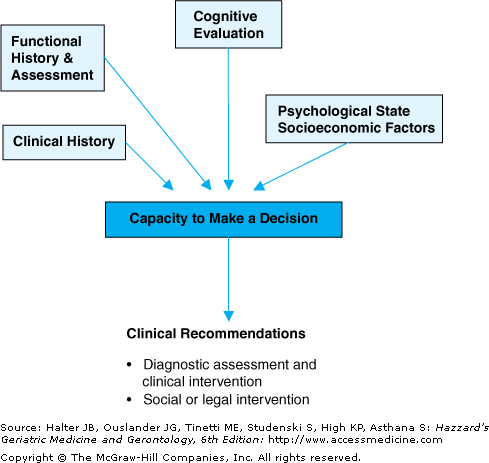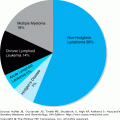Assessment of Decisional Capacity and Competencies: Introduction
The medical profession has been charged with the seemingly conflicting responsibilities of respecting patients’ autonomy while protecting from harm those patients who are incapable of protecting themselves. Assessing a patient’s capacity to make decisions is a role with which all clinicians should be familiar. Although certain situations may call for specialized assessment, generalists, internists, subspecialists, geriatricians, and advanced practice nurses, among other health professionals, should be sufficiently familiar with the principles and process to handle most situations. The purpose of this chapter is to explain some of the ethical underpinnings to this responsibility, to highlight the strengths and weaknesses of approaches to assessing decisional capacity, and to describe the types of situations in which the clinician may play a role.
Autonomy is defined as self-determination (see also Chapter 34). Respect for individual autonomy is understood to be an elemental principle of our society. Nonetheless, all of us face limitations on how much we can truly determine our fates. Limitations of resources and opportunity, societal and legal prohibitions, and the limits imposed by the rights of others not to have their autonomy infringed upon all limit one’s self-determination. There are also limitations on who qualifies as an autonomous “self.” The full right to self-determination is generally recognized to apply only to adults who are “of sound mind.”
Paternalism is defined as limiting an individual’s autonomy in order either to prevent that individual from doing harm to themselves or to prevent the person from missing a substantial benefit. The circumstances under which paternalism is acceptable are not defined by the action the individual may wish to undertake, or by the probable untoward consequences of an action, but rather by the individual’s ability to make decisions. In other words, our wish to protect an individual from doing themselves harm does not justify paternalism; we cannot prevent an individual from doing things that may cause them harm (overeating, bungee jumping, etc.). We can only justify intervention if we judge that an individual lacks the capacity to make decisions. In such a case, we are responsible for protecting the person from the possible harm of an incapable decision.
The interplay between these concepts becomes apparent when the person is no longer felt to be “of sound mind.” This chapter will focus on those individuals who have cognitive impairment or a clouded sensorium (fixed lesions, dementia, or delirium) and will not discuss the competence of individuals whose decisional capacity may be impaired by psychiatric illness. When patients are cognitively impaired, clinicians have an obligation to respect their rights, to protect their persons, and to consider the safety of the public. This often requires careful balancing of conflicting imperatives.
Definition of Decisional Capacity
In the broadest sense of the word, for an individual to be competent, that individual must be well qualified to do whatever task they are doing. In the context in which we are talking, competence is viewed as a legal term. It refers to a judge’s ruling as to whether an individual has been deemed capable of making their own decisions. An individual adjudicated to be incompetent must have a guardian appointed to make the decisions for the area (or areas) in which the person has been found to be incompetent. Although guidelines vary somewhat from state to state, it is generally accepted that a ruling of incompetence cannot be made solely on the basis of a medical diagnosis, age, level of education, or personal eccentricity. An adjudication of competence or incompetence is based on an assessment of the individual’s decisional capacity and that individual’s demonstrated ability or inability to carry out a plan. Therefore, the assessment of decisional capacity should include not just the patient’s cognitive ability, but other factors that may be influencing their ability to decide. This would include emotional state, functional ability, psychosocial situation (especially with regard to coercion), and financial and environmental limitations (Figure 13-1).
There are four necessary elements to making a capable decision; understanding, appreciation, reasoning, and expressing a choice (Table 13-1). First, the individual must be able to comprehend the information being considered sufficiently well to understand the important or relevant facts. That information must have been presented in a clear and concise manner with special attention taken to ensure that barriers such as hearing impairment, illiteracy, or language difference do not constitute the sole reasons that the person is unable to understand the information. Other issues, such as aphasia, delirium, or depression, may also interfere with the individual’s ability to comprehend and retain information.
ABILITY | DESCRIPTION |
|---|---|
Understanding |
|
Appreciation |
|
Reasoning |
|
Expressing a choice | Articulation of a clear choice with regard to a specific decision |
Second, the individual must have the conceptual ability to appreciate the consequences of the decision that he or she is making. This includes both an appreciation of the risks and benefits of options and the ability to identify the consequences these risks and benefits will have on his or her life.
The individual must be able to reason, within their own frame of reference, why she or he is choosing a course of action. This is different than saying that a decision seems “reasonable” to the other parties involved, but rather it refers to the cognitive processing of values and beliefs in view of the information given. Judging the rationality of a decision can be tricky. Even if we feel—and even if most of society would feel—that an individual’s decision is irrational, it does not give us grounds to negate the person’s right to self-determination. Our society has a great respect for individuality and one’s right to express that individuality in a wide variety of ways. Nonetheless, an individual’s ability to give a plausible rationale for his or her decision is sometimes used as secondary evidence of decisional capacity. That is, demonstrating justification for one’s choices (e.g. religious belief, personal value, etc.) provides another level of assurance that the patient’s decision rests upon intact reasoning, rather than a set of delusional or incoherent beliefs that may often exist in the setting of cognitive impairment or psychiatric illness.
Finally, the person must be able to make a choice and communicate the decision. This is the lowest bar for decision-making capacity but one which may be impaired by specific damage in language or frontal lobe function as well as in severe global cognitive impairment.
One other consideration is sometimes used in judging an individual’s decisional capacity: consistency of the person’s decision. The inconsistency of an individual’s decision with past decisions made by that person provides an important clue to possible underlying cognitive or psychiatric problems that deserve exploration. But, in itself, inconsistency does not negate the person’s right to make decisions. Inconsistency of a specific decision over time may indicate that the individual has had difficulty with remembering or understanding the information provided and their cognitive abilities should also be explored.
Legal and Practical Aspects in Determining Decisional Capacity
In protecting an individual who is incapable of making decisions, one action that may need to be taken is applying to the local probate court asking that the individual be adjudicated to be incompetent and to have someone else appointed to make decisions. Although specifics of probate statutes vary among states, most follow a general pattern articulated in the Uniform Probate Code. Once an individual has been adjudicated incompetent, another person is appointed to represent his or her interests. This person is variably referred to as a guardian, conservator, or legal surrogate. We will use the term conservator. Although there are movements toward “limited conservatorship” that restrict the powers of the conservator to decision making in specific areas where a person has been shown to be incapable, there are two broad categories of conservatorship that are commonly used, those of finance and of person. Conservatorship of finance is a fairly self-evident term. Conservatorship of person grants a more global responsibility for assuring that the individual is kept safe and that decisions are made either as substituted judgment or on the basis of the individual’s best interests (see Chapter 34). These decisions may involve, for example, medical care, where a person will live, what help the person will receive to maintain himself or herself. The person may retain the ability to make a will (testamentary competence), even when he or she has been adjudicated as incompetent of person and finance.








